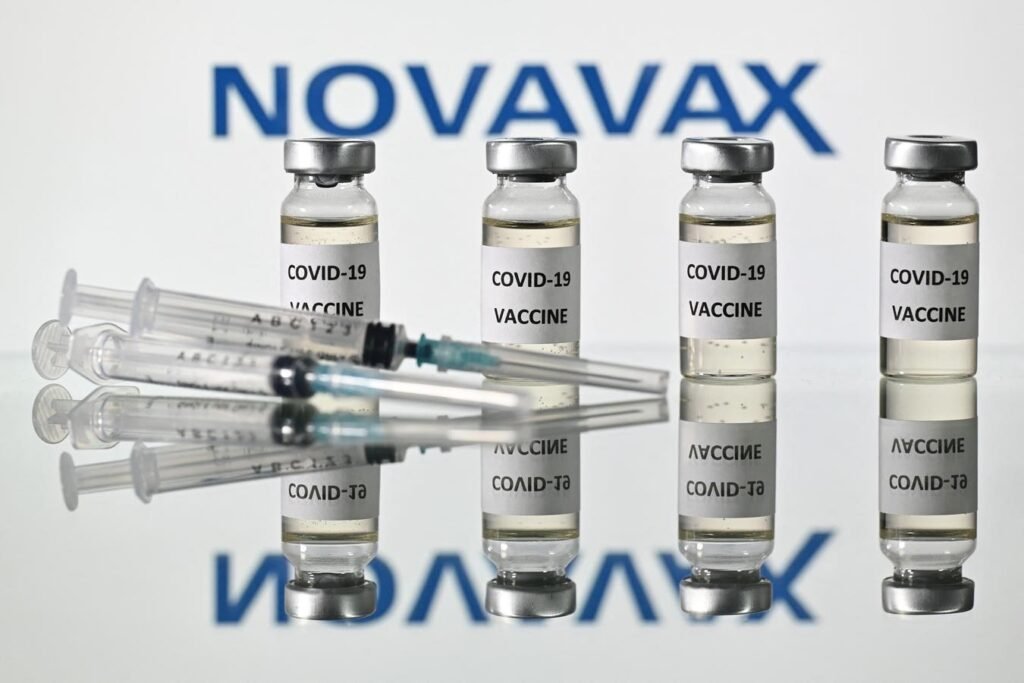An illustration picture shows vials with Covid-19 vaccine stickers attached and syringes with the … More
AFP via Getty Images
In a significant change in policy last month, officials from the Food and Drug Administration suggested requiring new clinical trial research to assess the effectiveness of COVID-19 vaccines in healthy individuals under 65, including pregnant women, before updating approval for a wider population. Simultaneously, in an update to its immunization schedule posted on May 29th, the Centers for Disease Control and Prevention include the option of COVID-19 vaccines for healthy children and pregnant women. The language used by the CDC suggests a collaborative decision-making approach where individuals consult with their doctor before receiving a vaccine.
A glimpse of the new FDA approach was seen when the agency made an unusual decision to limit the approval of the only non-mRNA coronavirus vaccine in the nation, Novavax’s nuvaxovid, for use only in adults 65 and older or individuals aged 12 to 64 with specific health conditions that increase their risk from COVID-19.
To broaden the indication, the FDA will mandate vaccine manufacturers to conduct booster trials to demonstrate effectiveness in individuals under 65 or without certain risks. These trials could take up to a year to complete, as reported by STAT. This timeline indicates that it cannot be achieved before autumn, even if Novavax, Pfizer, or Moderna choose to pursue this path.
Similar to annual flu shots that adapt to new strains, COVID-19 boosters enhance immunity against evolving variants. Data from several years of booster campaigns indicate lower hospitalization and death rates for boosted individuals compared to unvaccinated or non-boosted individuals. This benefit is particularly notable for vulnerable subpopulations categorized by age and underlying health conditions.
Both mRNA and non-mRNA COVID-19 vaccines are recommended for individuals over 65 or with medical conditions that increase the risk of severe illness or death. These conditions include obesity, physical inactivity, diabetes, clinical depression, and immunocompromised status. An estimated 100 to 200 million Americans may still be eligible for vaccination due to such health conditions.
However, this poses questions for individuals under 65 without underlying health conditions who wish to receive a COVID-19 vaccine in the upcoming fall. The FDA and CDC appear to have subtle differences in their current guidance for healthy individuals under 65. Will these individuals be able to receive a vaccine at a pharmacy without restrictions, or will they need approval from their doctor? Additionally, will their insurance cover the cost?
As The New York Times explains, insurance companies may act as gatekeepers by requiring medical documentation of an underlying condition before covering the cost. The out-of-pocket expense for patients could be as high as $140 per shot.
Top FDA officials Prasad and Makary endorse an evidence-based approach to COVID-19 vaccination and suggest aligning policies with those in Europe. European public health authorities have predominantly focused on ensuring that the elderly and high-risk individuals receive booster shots. This targeted approach contrasts with the universal recommendations previously issued by the CDC, which did not differentiate based on age or risk factors. Despite this, European regulatory agencies like the EMA and MHRA have not proposed changes in marketing authorizations for boosters, such as age-based restrictions, for any approved COVID-19 vaccines. Moreover, COVID-19 vaccines are generally available free of charge across Europe, regardless of health status or age.


